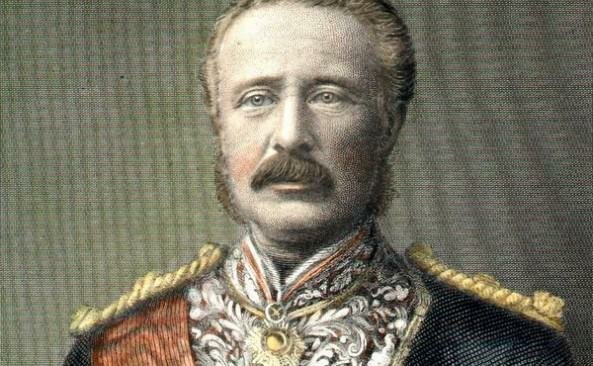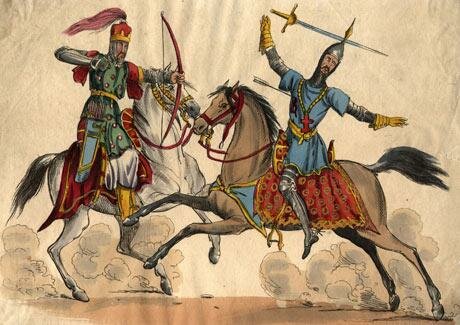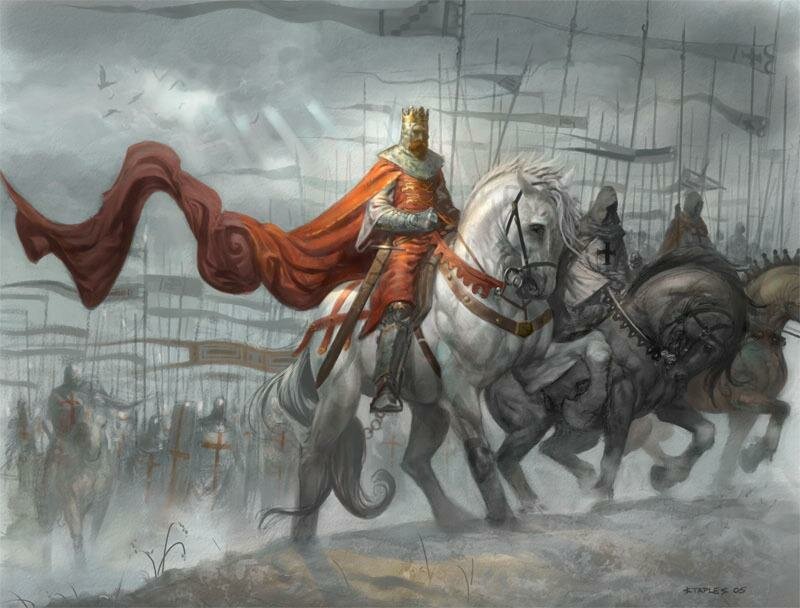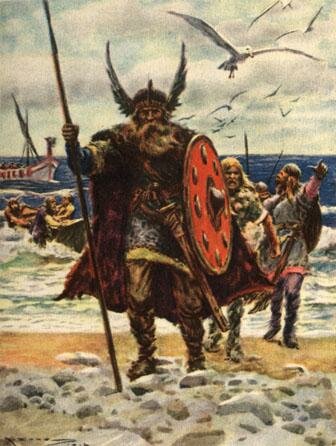Top 10 Wars in the Name of Love
Suggested by SMSThe paradox of “A War Started In The Name Of Love” is best illustrated in the protest movement of the sixties, “Make Love, Not War”. But the strength of emotion that can possess men when feelings of love are stirred can drive them to the most illogical of actions, war being the absolutely clearest example. But it is important to realize that the “Love” that drives men to war is not essentially one tied to lust or even the love between a man and a woman. Other forms of “Love” are probably as relevant or even more so, such as love for a leader or love for a publicly adored figure who has suffered an unfair demise. Nonetheless, whether they are full scale wars, battles within wars or simply acts of war, the use of military resources to satisfy the heart or other driving, pulsating forces of men has a place in history. There are many moments in history where love, in many forms, if it doesn’t conquer all, leads to the conquering of many. The top ten such events follow, moving from tenth to the most significant.
10. Fighting Over The Sabine Women
The conflict over the Sabine women began as a desire for love and ended in the name of love. It is estimated that around 750 B.C.E. Romulus and the first men who inhabited Rome realized that the city would have a very limited life if they couldn’t attract some women to develop a sustainable population. So they approached the nearby cities and promised the women there strong, virile men and a vibrant new city. But their neighbors weren’t convinced and the Romans were forced to take more scurrilous steps. They invited the members of the proximate cities to a festival full of games, feasting and fun. But once the visitors were comfortably in the city, the Romans turned on them carrying away the maidens that they swore to love and cherish, mostly Sabine. Given the high spirits of the festival and the sudden ferocity of their hosts, many of the visiting men were stunned and shocked and could do nothing but escape with their lives and wives, leaving the maidens in the care of the Romans. Despite Romulus attempts to assure the Sabine men that the maidens were being treated with the highest regard and were happy with their new lives, the Sabine men were beyond comforting and marched as an army on Rome. But love again entered the conflict in the form of the women themselves. Out of love for their Sabine families and their new husbands, the women stood between the armies and demanded peace. For a brief moment there was the potential for the men to actually fight over the women, but so moved were they by the courage and love of the women that both sides laid down their weapons. Happily, love was the cause of saving so many lives and creating the majestic city of Rome.
9. The Love Of The Iceni Celts
The love for a leader is often proclaimed, but to go to war over that love is a far less common shift from words to actions. Such was the love of the Iceni Celts for their Queen Boadicea and so passionate were they that they nearly managed to rout the Romans from England.
In 61 C.E., at the death of Praustagus, the king of the Iceni and the husband of Boadicea, a dispute arose between the Romans and the queen. In an act of arrogance the Roman soldiers publicly beat Boadicea and raped her two daughters. The response of the Iceni Celts was to rise up behind their Queen and for the next two years Roman settlements were raided and the Romans faced defeat at the hands of a people fighting for the love of their Queen. The Romans eventually rallied and with their greater resources defeated, Boadicea, the warrior Queen.
8. The Vengeance and Love Of A Nation
While it is conceivable that wars can be started out of love for a country or a God, it is possibly scarcer that even a battle should be engaged out of love for a single man. Yet, military historians raise the case of General George Gordon as a leader who was so loved by the public of his day that his death could only be answered by retaliation and routing. The son of a Royal Artillery officer, George Gordon held a number of impressive posts throughout the world. Known as “Chinese Gordon” after his exploits in Asia and having been named Governor General of the Sudan after the Government’s hand was forced by public cries for “Gordon of the Sudan”, General George Gordon was sent to Khartoum in 1884. He was to conduct an orderly withdrawal of British and Egyptian troops. But, showing the judgment and care for his men that had won him such favor, Gordon held back on the evacuation as there were too few safe boats available. The British Government, incensed by his reluctance to follow their orders immediately, refused to send support, even when Gordon was under siege by the Mahdi.
It was not until January, 1885, that reinforcement arrived, which was sadly two days after the fall of Khartoum and the death of General George Gordon. The anger and grief in England extended from the common peasants in the streets to Queen Victoria herself and was pointed at the Government. In 1896, Horatio Kitchener set forth to reconquer the Sudan and, perhaps more importantly, avenge the death of General Gordon. Two years later, he exercised his wrath on the Mahdi forces at Khartoum, killing 10,000 for the loss of only 47 and wounding 13,000 compared to 382. The cost of fighting such a battle was extreme, but this fact was set aside as it was essential to the healing of a nation that retribution be gained for the murder of the much-loved General George Gordon.
7. The Hermit and The Convent
The Arthurian Legend has been granted many starting points, but the appearance of Guinevere occurred around 1136 B.C.E.. She was the love and queen of Arthur and part of her dowry was the famous Round Table that became the basis for an egalitarian system of government. But Guinevere was smitten by Arthur’s most loyal and noble knight, Sir Lancelot. His charm and infatuation with her drew them to a point of adultery. The affair was exposed by less noble means the lovers escaped to the Lancelot’s castle. The battle that followed as Arthur and his knights attacked Lancelot’s stronghold was bitter and heartbreaking for all involved. But the walls were impenetrable and eventually Arthur withdrew tragically. Unable to face the relationship that had destroyed the dream of Camelot, Guinevere and Lancelot separated. Lancelot retiring to the life of a hermit and Guinevere entered a convent and became a nun at Amesbury. Tales of Arthur and Camelot are often considered legend, but the legitimacy and accuracy of many moments in history can be disputed. The battle between Arthur and Lancelot was one waged in the name of love.
6. For The Love Of God
A war or a series of wars started in the name of love do not have to involve love between a man and a woman. They can be fought in the name of love for a deity as was the case in the 11th century when the Pope Urban II offered indulgence to those of the First Crusade on the basis that “they have committed their property and their persons out of love of God and their neighbor”. This love of God as the basis of the Crusades persisted throughout the 11th, 12th and 13th centuries as kings, nobles and countless Christian soldiers marched to fight the infidel. Popes and bishops gave commitments to those that were prepared to lay down their lives for the one true God. Throughout the Middle Ages the role of God and religion in the life of most Europeans was a major consideration. Laws, science and morality were dictated by religion and one’s love of God was seen as a feature that could determine a man’s worth in society. More importantly love of God could determine a man’s place in heaven. The battles of the Crusades were some of the bloodiest and most savage in history. The loss of life was estimated to be between two million and six million Christians. Most importantly, they weren’t battles fought to gain territory for a beloved monarch or to avenge a lover’s demise; these conflicts were to regain the Holy Lands for a loved God and to free His birthplace.
5. The Rough Wooing
The Rough Wooing was a “war in the name of love” in name only. Declared by Henry VIII of England in December, 1543, the war lasted almost seven years to March, 1550 and was the last significant armed conflict between England and Scotland before the Union of the Crowns in 1603. The war was intended to persuade, somewhat heavy-handedly, the Scots to settle for a betrothal of Edward, Henry’s six-year-old son, to Mary, the infant to be proclaimed Queen of Scots. In that way, it was a war almost demanding love rather than being in love’s honor. The resistance to an English king in Scotland was sincere and widespread. This and the presence of a French influence in the matter, led to Scotland maintaining her rejection of Henry’s request. Despite the hostilities that were undertaken and Edward VI’s continuation of the war after the death of Henry, the conflict became irrelevant and the Treaty of Boulogne was signed between France and England in 1550. The desire of the match was lost and the conditions of peace were only enforced for a short time, suggesting that no-one really cared that much after all.
4. The Love Of The Lionheart
The legend of Richard I of England, more commonly known as Richard, the Lionheart, stretches across much of the known world of the twelfth century. From crusader to the liege of Robin Hood, the truth of Richard I is sometimes disappointing, but his exploits in conquering Cyprus reflects not only a great leader, but a man determined to look after his love. In April 1191, three of Richard’s ships travelling from Sicily were subject to a mighty storm. Two were wrecked on the shore of Cyprus, while a third, carrying his sister, Joanna, and Princess Berengaria, his intended wife, lay at anchor off the coast. The survivors of the wrecks were taken captive by the Emperor of Cyprus, Isaac Comnenus, and the third ship was refused water and supplies, in the hope of forcing the occupants to land and also be captured. Isaac’s first piece of misfortune was in Richard’s quick arrival after the storm and his request that the prisoners be released and the property stolen from them and the ships returned. Isaac declined, but being unpopular with his subjects he then decided to talk peace with Richard before he gained their support. His second stroke of poor luck came as he realized how few men Richard had with him and Isaac decided to return to his belligerent stance in the hope of defeating the King. But as he prepared for battle, King Guy of Lusignan arrived with forces to support Richard. The Cypriot army fell quickly, Isaac fled and Richard married Berengaria on Cyprus. Richard then appointed two governors and he and Berengaria left as the King and Queen of Cyprus.
3. The Love Of A Faithful Man’s Wife

Even the bravest and most blessed are susceptible to the power of love. Few could claim to be as honorable as King David, the man who courageously faced and slew Goliath and then led his people on a military rampage through the Holy Lands winning for them the hallowed lands of Israel. However, around 975 B.C.E. David looked from his palace rooftop and was transfixed by the beauty of Bathsheba. Entranced by her magnificence, he was troubled by the fact that she was married to one of his soldiers, Uriah, but not troubled enough to stop him sleeping with her. But their dalliance could not end that simply as Bathsheba fell pregnant to her King. Now, in the face of the scandal of adultery and driven by his rapture of Bathsheba, the battle for Rabbah became a battle for her love for David. He ordered that Uriah be in the most dangerous position as the army marched into the fray and left it to the charging soldiers of Rabbah to kill the husband of the King’s lover. Bathsheba and David married and she bore him a son. But the wrath of God would be wrought on the King and not his people. They would not lose their leader and inspiration, but he would lose his child, who died soon after birth. Although he never knew it, Uriah had been the victim of a biblical battle in the name of love.
2. The Love Of Two Roman Heroes
Egypt was a mighty nation in her own right in 47 B.C.E., but the demise of the pharaoh and the descent of the country into civil war at the hands of Cleopatra and her brother and husband, Ptolemy XIII, threatened to ruin a great civilization. In fact, the entrance of Julius Caesar and the subsequent war that he fought on Cleopatra’s behalf restored peace and stability to the region. Having been exiled by her younger sister, Arsinol, Cleopatra plied Caesar with all the charms that a beautiful eighteen-year-old girl could possess. She captured his heart and he led the Roman legions in a war that would see Cleopatra returned to the throne of Egypt. Their love blossomed from this victory and she even travelled to Rome with him, but shortly after his assassination she returned to her homeland. With Caesar’s death civil war broke out in Rome and Cleopatra found strong opposition, as did Caesar’s second in command Mark Antony. When he had established his strength in Rome, Mark Antony, who was already in love with her, followed Cleopatra to Egypt. There their romance flourished, despite the arranged marriage awaiting him in Rome. For love of Cleopatra, Mark Antony eventually waged war on Rome, but the might of the army he had once led was too great. Once Egypt was defeated, both Mark Antony and Cleopatra took their own lives rather than face their captors. By 30 B.C.E. Cleopatra had managed to have not just one war fought in the name of a man’s love for her, but two. This must be recognized as a major feat and explains her place in history as a great leader.
1. Helen of Troy: The Love Promised By A Goddess
There are few better examples of a war being fought in the name of love than the Trojan War. While some argue that Menelaus pursued Paris and Helen and engaged in the action that followed out of pride or jealousy, the romantic would rather believe that it was love that lay at the root of the conflict. Legends are rarely improved by dates and the pursuit of evidence, but it is interesting to recognize that the Trojan War has a place in history. It is believed to have occurred around the 11th or 12th Century B.C.E. and holds a special significance in Homer’s Iliad and Odyssey. Although he claimed that he was led to Helen as an act of God, or rather Goddess in Aphrodite, Paris left with the girl in his hand. Some accounts suggest that it was abduction, while others that it was a romantic elopement; either way Menelaus pursued them all the way back to Troy where battles and sieges took place. In the end another famous piece of Greek legend, the Trojan horse, led to the defeat of Troy and the deaths of Hector, Achilles and Paris. But, having made her feelings, or lack thereof, for Menelaus known, Helen took the opportunity to marry Paris’ brother Deiphobus. Yet, in time, she would also see to his demise with the help of Menelaus and they would again be united. Perhaps there always was love there and the siege of Troy was worthy of a great love story.



















[...] I found love stories the easiest to write. It’s the most fundamental human emotion. It has started wars. It’s inspired some of the most beautiful works of art and architecture the world has ever [...]
[...] I found love stories the easiest to write. It’s the most fundamental human emotion. It has started wars. It’s inspired some of the most beautiful works of art and architecture the world has ever seen. [...]